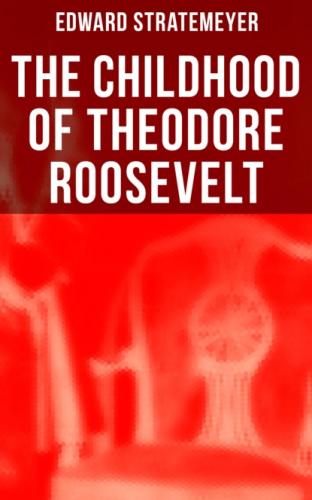Edward Stratemeyer
The Childhood of Theodore Roosevelt
Published by
Books
- Advanced Digital Solutions & High-Quality eBook Formatting -
2021 OK Publishing
EAN 4064066380786
Table of Contents
PREFACE
The life of Theodore Roosevelt is one well worth studying by any American boy who wishes to make something of himself and mount high on the ladder of success.
The twenty-sixth President of our country is a fine type of the true American of to-day, full of vim and vigor, quick to comprehend, and equally quick to act, not afraid to defend his opinions against all comers when satisfied that he is in the right, independent, and yet not lacking in fine social qualities, physically and morally courageous, and with a faith in himself and his God that is bound to make for good so long as he clings to it.
Theodore Roosevelt comes from countless generations of fighting stock, both in this country and abroad. And yet as a youth the future hero of San Juan Hill was a delicate lad, and many fears were entertained that he might not live to manhood. But life in the open air, with judicious athletic exercise, accomplished wonders, and he became strong and hardy to an astonishing degree.
The boyhood days of the future President were spent in New York City and at the family's country home, Oyster Bay, Long Island. From there he went to Harvard College, from which he graduated with high honors. Still somewhat delicate in health, he travelled in Europe, studied for a short time at Dresden, and took to climbing the Alps and other noted mountains.
His mind had gravitated toward literature, and he was writing a naval history of the War of 1812 when something prompted him to take up politics, and almost before he knew it he was elected a New York State assemblyman. He served in this capacity for three terms, and many are the stories told of how he fought against corruption first, last, and all the time.
The death of his first wife and of his beloved mother were at this time a great blow to him, and leaving his one little daughter with relatives, he struck out for the great West, where, in the Bad Lands, so called, he located as ranchman and hunter, filling in his spare hours by studying and by writing on various outdoor subjects, works which have become decidedly popular, and which show well his gifts as an author and as an observer of nature.
While still in great part a successful ranchman, he ran for mayor of New York and was defeated. He now devoted himself with increased energy to his literary labors until, soon after, he was appointed by President Harrison a member of the Civil Service Commission. He served on this commission with marked ability for six years, when he resigned to become police commissioner of New York City.
Theodore Roosevelt's work as a police commissioner will not be readily forgotten. The whole tone of the service was at once raised, and for the first time in many years the metropolis had "dry" Sundays, when every saloon in the city was tightly closed. This strict compliance with the law made him some enemies, but to these he paid no heed, for he was doing only his duty.
When William McKinley was nominated for the Presidency the first time, Theodore
